
Announcements

Announcements
The prestigious education system & the rich & diverse cultural heritage of Ireland make it a perfect study-abroad destination. Ireland hosts 3% of the top universities from all over the world, hence making studying in Ireland a worthy option for students. However, the admission criteria to these top 3% institutions varies from institution to institution & program to program.
If you are aiming to study in Ireland, then you must explore the wide range of course options available across disciplines. Hence, based on the course selection made by you the study duration & cost of studying in Ireland can vary. Further, to ease the financial burden, international students can also apply for scholarships & other financial aid available to Study in Ireland.
Ireland not only offers studying options, but it also offers post-work visas to international students making it easy for the graduates to find work & get placed. You can further go through the sections below to get all the required details to study in Ireland.
Before embarking on your journey to study in Ireland, it's essential to examine the key highlights provided below.
| Aspect | Details |
|---|---|
| Universities in Ireland | 10 universities, 10 Institutes of Technology, 7+ private higher education institutions |
| Average Living Expense | INR 9.6 Lakhs or €10,000 |
| Popular Courses in Ireland | Business Analytics, Computing & IT, Engineering |
| Part-time Work Allowance | 20 hours/week |
| Post Study Work Permit in Ireland | Up to 24 months |
| Ireland Study Visa cost | Single entry: €60, Multiple entry: €100 |
Ireland is among the world’s fastest-growing economies and welcomes students from over 160 countries offering higher education in different disciplines. Also, it has been ranked as the 16th happiest country in the world. Several reasons exist which result in attracting the interest of international & Indian students to study in Ireland. Some of these reasons include the world-renowned and prestigious Irish Universities, student-oriented curriculum, inviting demeanour of the Irish culture & being an English-speaking European Nation.
But these are not the only reasons why studying in Ireland is a perfect option. There are several others. Such include:
To study in Ireland, you must be aware of the potential costs of staying and studying there. Such costs can include the cost of living, the program fees, university application & other expenses associated. On average, the cost of living in Ireland ranges from 11,500 EUR to 25,000 EUR, whereas the tuition fees can vary based on the program selection, choice of university/program & the living standards of the preferred city.
You can check the cost breakdown below that can allow you to facilitate your financial planning & enjoy a convenient & affordable stay in Ireland.
The cost to study in Ireland for Indian students varies according to the program level and institute type, with significant portions allocated to tuition, accommodation, living expenses, and additional academic costs.
| Level of Education | Tuition Fee (EUR/Year) | Tuition Fee (INR/Year) |
|---|---|---|
| Undergraduate programs | 5,000 to 53,000 | 4.52 lakhs to 48 lakhs |
| Postgraduate programs | 5,000 to 49,000 | 4.52 lakhs to 44.37 lakhs |
| Doctoral degrees | 15,000 to 20,000 | 13.58 lakhs to 18.11 lakhs |
The cost of living in Ireland fluctuates based on lifestyle and city choice. Hence, while pursuing your Studies in Ireland, you can expect a certain level of variation in the total cost, depending on your location preferences & other selections.
| Type of Expenses | Cost (INR/Month) |
|---|---|
| Accommodation | 67,922 to 1.22 lakhs |
| Utilities (like electric/gas/refuse) | 5,252 to 6,792 |
| Meals | 28,527 to 40,753 |
| Travel expenses (monthly bus ticket expense) | 1,811 to 4,528 |
| Book & Supplies | 8,150 to 12,226 |
| Mobile and internet | 2,716 to 5,433 |
| Personal expenses (specifically social & sports) | 8,150 to 20,367 |
| Miscellaneous | 4,075 to 13,584 |
Find the right path with Meridean

#87
QS World Ranking
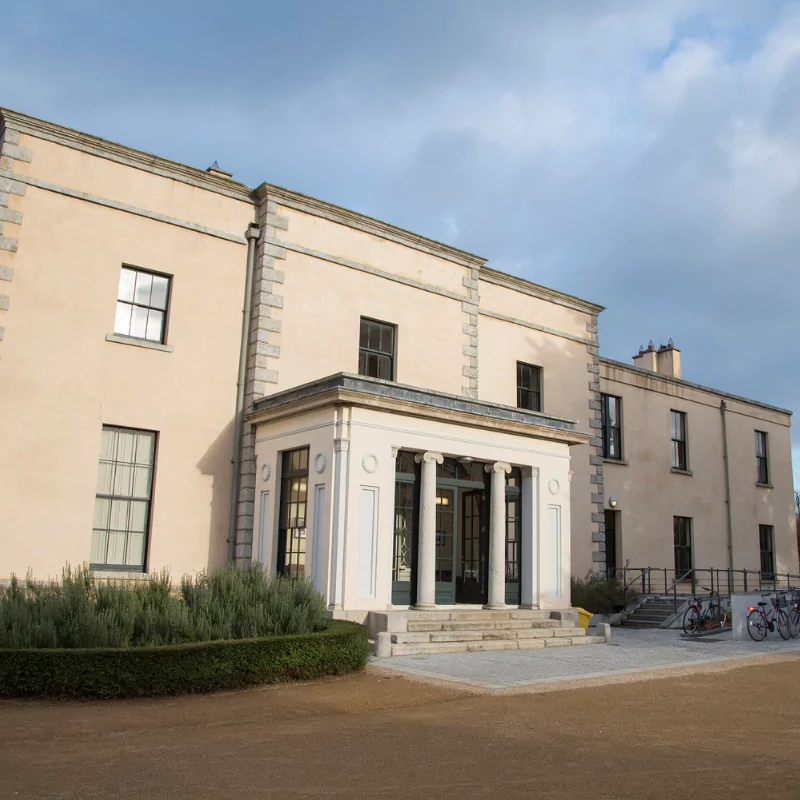
#126
QS World Ranking
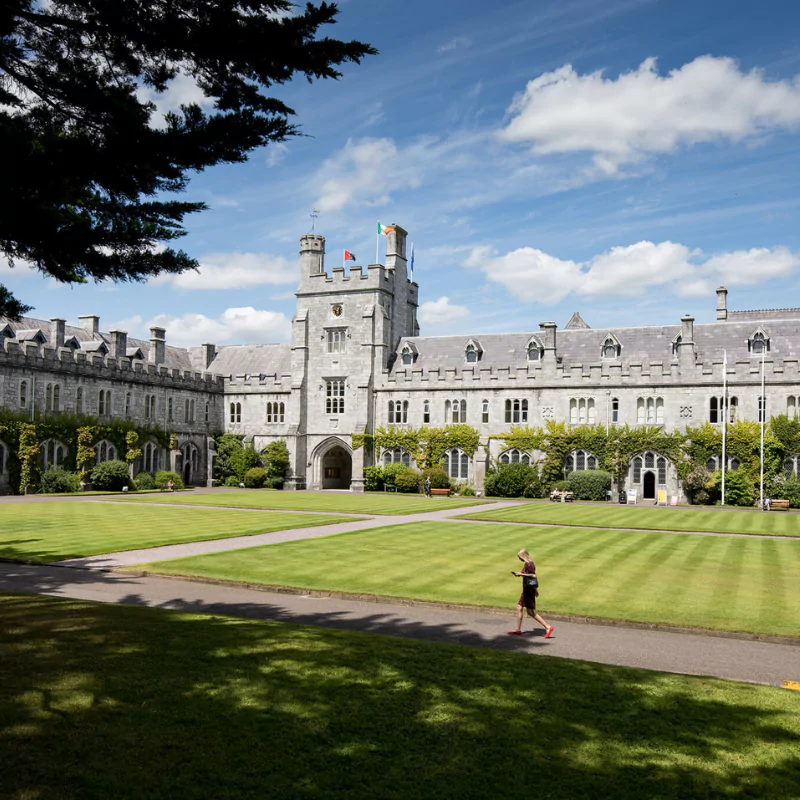
#273
QS World Ranking
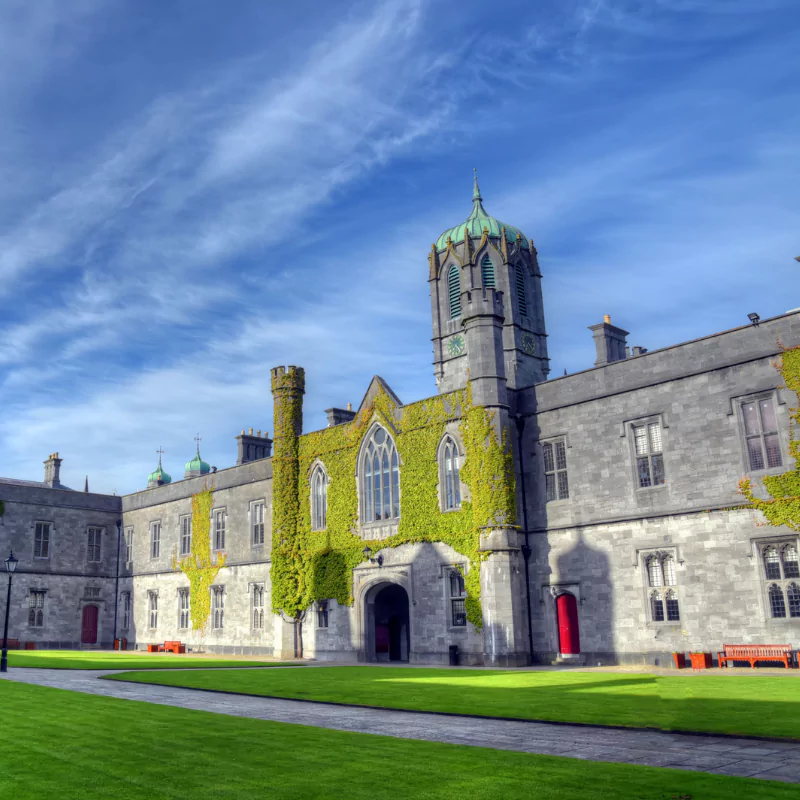
#273
QS World Ranking
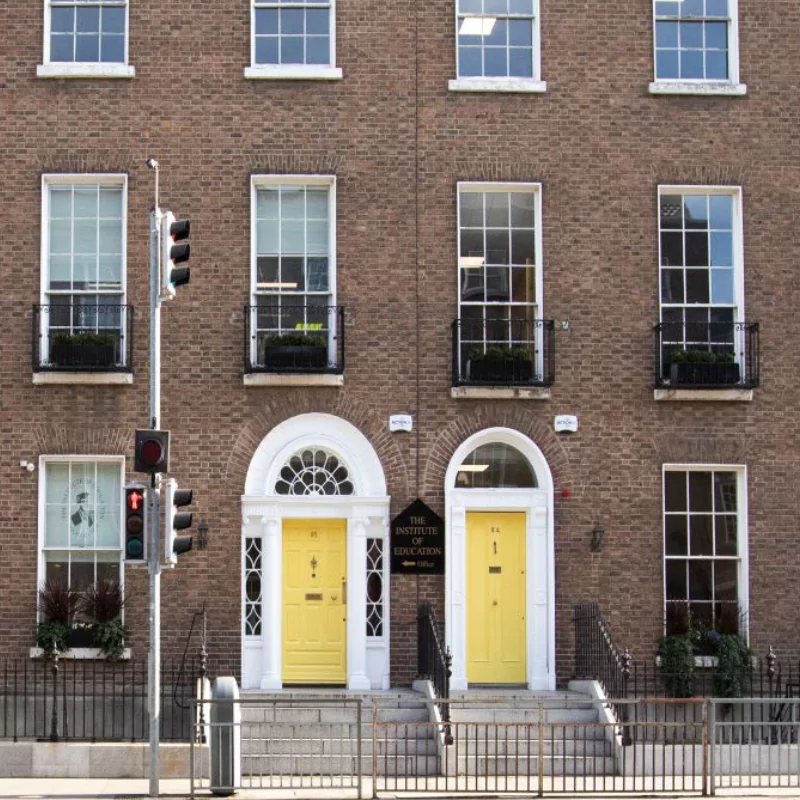
#421
QS World Ranking
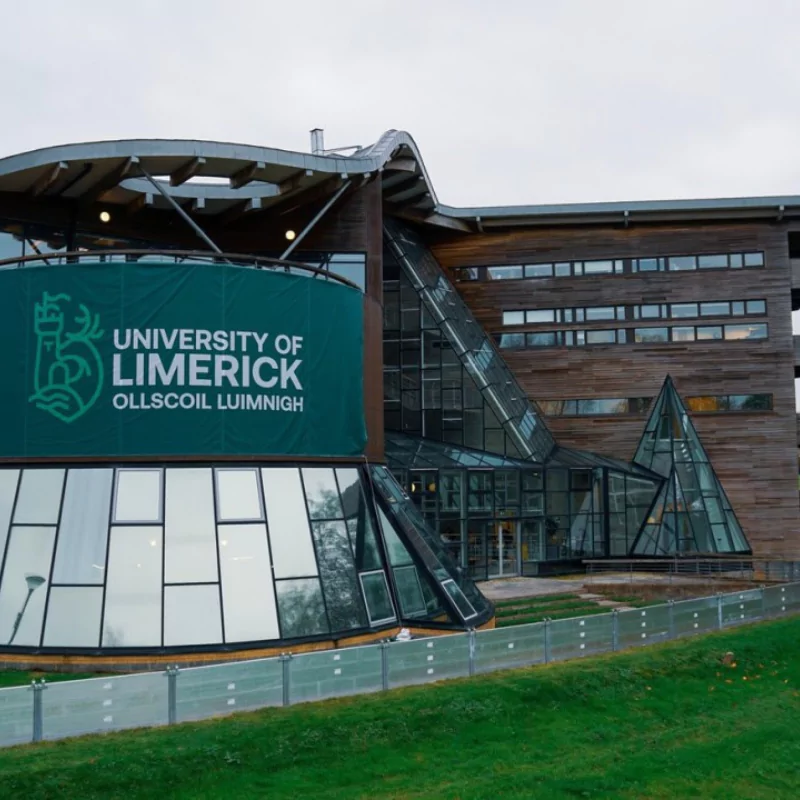
#421
QS World Ranking
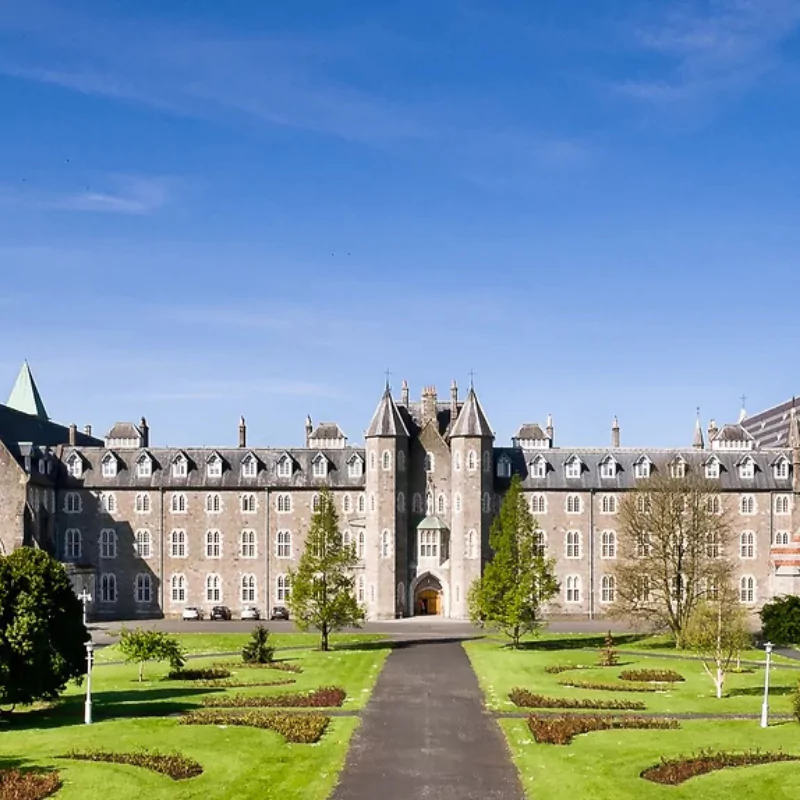
#801-850
QS World Ranking

#851-900
QS World Ranking
Now that you know the complete process, you should take a look at the basic information and requirements.
| Where to apply | At respective portals of the institute (Graduates can apply at common portal PAC for some institutes) |
|---|---|
| Application Fee | Varies (for PAC: 50 EUR) |
| Basic Requirements | Transcripts, Standardised Exams like GMAT/ GRE/ GAMSAT (for medical students) |
| Additional Requirements | Valid Visa, 2 letters of recommendation, Resume, Portfolio, Statement of Purpose |
| English LanguageRequirements |
IELTS: 6.5 or above (or equivalent)
TOEFL: 570 (PBT), 90 (CBT)
PTE: 63 - 65
|
You must be aware of the timeline and course deadlines when you are applying to Study in Ireland. Such deadlines can vary from university to university & institution to institution. Hence, you must plan for your program or course in well advance and should look for universities inviting applications or program intakes at a specific university.
If you are planning to take admission to Study in Ireland, then there are two intake options that you should be aware of:
Also, you can connect with the study abroad consultants at Meridean Overseas to know more in detail about the intakes & the deadlines.
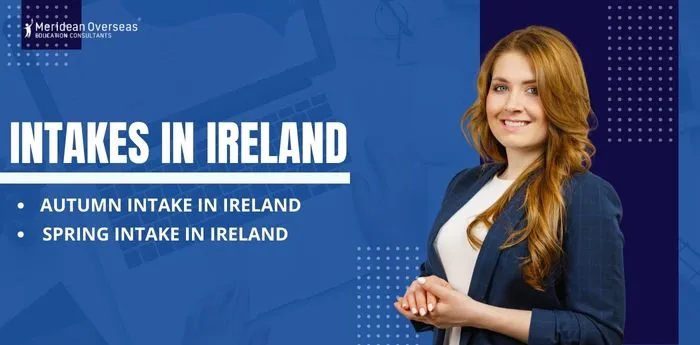
If you are looking for programs to Study in Ireland for Indian Students, then you are going in the right direction that can help you fulfill your study abroad goals. Such is because Irish universities offer a range of courses & programs across fields & disciplines that can allow you to choose your preferred course & study in Ireland.
The below list includes the top & most commonly preferred courses that a student can opt for to study in Ireland at both graduate & postgraduate levels.
Data Analytics/ Big Data
Data Science and Analytics
Data & Computational Science
Business Analytics
Software Engineering
Computer Science
Electronic Engineering
Games Development
Banking & Finance
Actuarial and Financial Studies
Accounting and Finance
Investment, Treasury & Banking
Medicine
Nursing Studies
Pharmacy
Public Health
MBBS
Physiotherapy
Hospitality and Tourism Management
Hotel Management
Tourism Marketing
Event Planning
Restaurant Management
Connect With Meridean & Get Your Abroad Education Dream Fulfilled
To study in Ireland for Indian students, you have to provide certain basic requirements which depend on both the university and the course you are picking. Besides other requirements, there are some standardised exams that you have to attempt for admission, such as the GMAT, GRE, or GAMSAT (for medical students).
In general, English courses in Ireland universities must require an English proficiency assessment to evaluate your skills, where you can either check on what’s university’s requirements else you can pick whichever you want. However, the minimum score requirement for your selected university or course may differ. Head over to the below details in brief.
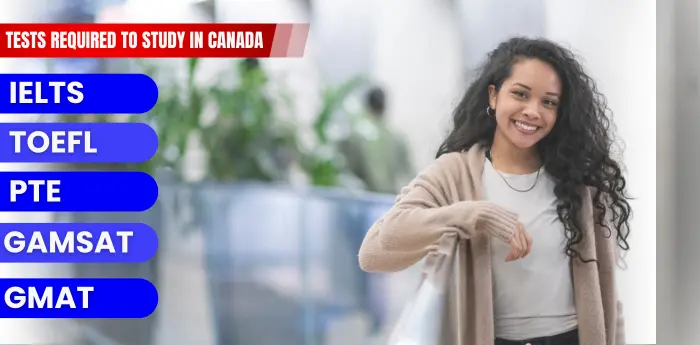
To Study in Ireland, you must have a valid student visa, for which you can apply at the official website of the Irish Immigration Service & submit all the required documents. However, there are certain cases, in which you can get a permit to stay in Ireland for about 3 months. Such a permit is majorly dependent on the country you are from.
The best approach to knowing whether you are eligible for a visa program or not is through consulting an abroad education consultant at Meridean Overseas. However, it is recommended that you typically apply for a visa at least 3 months before your travel date so that get the required approvals & can start your studies from the very first day of the session. Also, it is recommended because visa approval for Ireland takes about 8 weeks for final approval.
Further, the potential cost of visa application is somewhere around ₹8,991, & can further vary depending on your specific course requirements & eligibility. The best part of applying for a student visa in Ireland is the higher acceptance rate which is somewhere around 96%. Hence, if you have got all your documents right on time, then there are chances of getting a smoother visa approval.
Ireland offers a range of scholarship options to both Indian & International Students applying from across 160 countries. However, depending on the institution & course you have applied for, the scholarship eligibility can vary, hence it is important to consult with experts to know about the scholarships & other financing options that can fund your course.
Some commonly available scholarship programs in Ireland are DCU International Student Scholarships, NUI Undergraduate Merit Scholarships, and National College of Ireland Scholarships. Apart from this, there are several other scholarships offered by the government or other private institutions to aid international students while studying in Ireland.
To help pay for study in Ireland for Indian students, we have gathered a list of a few common scholarships along with their details.
| Name of Scholarship | Level of Study | Countries Eligible | Eligibility Criteria | Applications Open | Amount |
|---|---|---|---|---|---|
| Centenary Scholarship Program | One-year tuition fee | Students from Brazil, China, India, Indonesia, Japan, Kazakhstan, Malaysia, USA, among others | Must be accepted to a program at DIT; Submit application form | Form to be mailed by email | Free |
| Opportunities in Ireland for Ontario College Graduates | Reduced tuition fee | Students from Ontario | Must be enrolled in a program in Ontario; Apply through www.thea.ie | www.thea.ie | Over 15% reduction |
| Irish Aid Fellowship Training Program | Full-time program | Students from Tanzania enrolled in full-time program at University in Ireland | Must be enrolled in a full-time program in Ireland; No application required | www.irishaidfellowships.ie | - |
| Postgraduate Fellowships: The Walsh Fellowships | Research work | For international students in Ireland pursuing research work | Must be enrolled in a research program; Awarded by academic staff | Made by academic staff | 28,760 EUR |

I applied visa for Australia through this website . Mr. Prashant &Mr. Prakash made the job hastle free for me. They were friendly, helpful & available all the time .My work is done in a smooth way & I highly recommend them. Moreover, you can book the free counselling session with them that give you the proper guidance to study abroad. I have no complaints and I am very grateful for the support 🙏

Meridean Overseas is best in Ahmedabad. Prashant Sir is very supportive and gives his best efforts for every applicant’s visa process. They have very good coordination with universities in Australia. I got Australia Dependant Visa today, so very happy for this and very thankful to Prashant Sir from Meridean Overseas, his work is best. I am extremely happy with the Meridean Overseas Education, Ahmedabad.

I would like to thank you very much for your time and support during my visa adjustment process and for helping me to obtain the desired outcome. I am also very thankful for your help in preparing me for the university interview which made the approval of my visa adjustment very successful. Best institute in India if you want to study abroad. I am personally thankful for SOMYAA KHANGAROT ma’am. She is very supportive and also motivates the students. Again thank you so much MERIDIAN Overseas and their team. ❤️💕

Vineeta, the stellar counselor at Meridean Overseas, made my study visa journey for New Zealand overseas education hassle-free. Actually i didn't put my file in merdian, but I put in another consultancy, they are not gave such support. Also, I am wroking person. One day I see Video in Instagram and contact to Meridian Overseas. about my visas queries and my visa slots. So they always help me in without any fees. On that day my consultancy didn't call me for the slot opening. But Merdian team call me for the slots and because of that I booked my slots.
So I Appreciate their work and Also, I recommend to my family member and friends.

First of all i would say full team of Meridean Overseas is very hard working generous and supporting people and my consultant Mr. Shubhang is very honest and very supportive person and while in the meeting. He told me each and everything clearly and nicely. I was really very impressed and got so many information during the meeting. And you all won't believe the meeting was absolutely free . You can also go and meet the team They are very friendly and clean as glass. If you are willing to go to abroad please consider them and give them a chance to consult you.

I had a wonderful experience with Meridean Overseas. My counselor's name is Miss Tanya Soni. She was incredibly helpful in every aspect, her guidance helped me a lot in understanding my process and solving my problems with the best possible solutions. I am very interested in studying in Poland, and Tanya ma'am helped me significantly, because of her guidance, my dream has come true. I'm very grateful for choosing a counselor from Meridean Overseas.

So far, my experience with Meridean Overseas has been truly remarkable. The experts at Meridean Overseas possess impressive knowledge and demonstrate a strong commitment to providing friendly service to their clients. My process consultant Miss Rashi, stands out with her profound understanding and consistent helpfulness. She is adaptive and ensures the completion of tasks in a timely manner. The team responds promptly to queries, and I am genuinely satisfied with the assistance received thus far. I have high expectations that the remainder of my visa application process will be handled with the same level of professionalism and efficiency.
Thank you, Meridean Team.

My experience with MOEC has been great. I would recommend MOEC for students who wants to pursue their further studies in abroad as their staff is extremely helpful and suggests the best. My counsellor has been really supportive throughout the entire process, from course selection to till visa approval. She always clarified my doubts and helped me in every single way possible and I highly appreciate it.
Ans. The cost of studying in Ireland varies depending on factors like the institution, course, and lifestyle. On average, tuition fees range from €5,000 to €53,000 per year for undergraduate programs, €5,000 to €49,000 for postgraduate programs, and €15,000 to €20,000 for doctoral degrees. Additionally, living expenses range from €11,500 to €25,000 per semester.
Ans. Popular scholarships for Indian students to study in Ireland include the Centenary Scholarship Program, Opportunities in Ireland for Ontario College Graduates, Irish Aid Fellowship Training Program, and Postgraduate Fellowships: The Walsh Fellowships. These scholarships offer financial assistance covering tuition fees or providing reduced tuition fees for eligible candidates.
Ans. The best time to apply for admission to Irish universities depends on the intake you are targeting. For the Autumn Intake/Semester 1, applications typically close in June or July, while for the Spring Intake/Semester 2, deadlines fall between October to December.
Ans. Ireland is not necessarily a cheap country to study, but there are opportunities for scholarships and financial aid to help alleviate costs. Additionally, the quality of education and the post-study work opportunities make it a worthwhile investment for many students.
Ans. Yes, it is possible to apply for Permanent Residency (PR) in Ireland after completing your studies, provided you meet certain eligibility criteria such as having a job offer, fulfilling residency requirements, and meeting income thresholds.
Ans. The IELTS score required for studying in Ireland varies depending on the institution and program. Generally, most universities require a minimum IELTS score of 6.5 for postgraduate courses and 6.0 for undergraduate courses.
Ans. Universities in Ireland typically accept a gap of up to two years for undergraduate programs and five years for postgraduate programs. However, it's essential to check the specific requirements of each university and program.
Ans. Obtaining a Permanent Residency (PR) in Ireland can be challenging, as it requires meeting specific eligibility criteria, including residency requirements, having a job offer, and demonstrating sufficient income. However, with proper planning and fulfilling the necessary conditions, it is achievable.
Ans. While Master's programs in Ireland are not entirely free, there are opportunities for scholarships and financial aid to cover tuition fees partially or fully for eligible students. However, it's essential to research and apply for scholarships well in advance.
Ans. Yes, international students can work while studying in Ireland. The student visa allows students to work part-time for up to 20 hours per week during term time and full-time during holidays. Working while studying can help cover living expenses and gain valuable work experience.
Contact MOEC Experts for Study Abroad Guidance!
